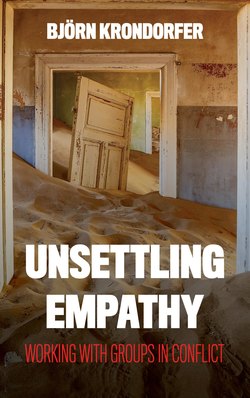Читать книгу Unsettling Empathy - Bjorn Krondorfer - Страница 6
На сайте Литреса книга снята с продажи.
Facilitation
ОглавлениеConcretely, what are the places and occasions from which I draw observations and thoughts on unsettling empathy? My experiences with facilitating and guiding groups in conflict go back to the 1980s, and over the last four decades this practice has informed—and, vice versa, was informed by—my corresponding scholarly and academic activities.
My first extensive intercultural encounter (more as participant than facilitator) happened in the early 1980s in a performance group with American Jewish and non-Jewish German dancers and actors. Together with a Jewish friend, I cofounded The Jewish-German Dance Theatre, where we confronted communal, cultural, and personal memories of the Holocaust and turned these explorations into a full-length performance. For almost four years, we toured in the United States and Germany, presenting our performance in diverse locations such as Jewish communities on the U.S. East Coast, small towns throughout Germany, historically fraught places like Nuremberg, and urban centers like Berlin and New York.[9] In June 1989, a few months before the fall of the wall that separated Germany for twenty-eight years as a result of the Holocaust and the ensuing Cold War, our group crossed the heavily guarded border into East Berlin as guests of the East German Jewish community. It was one of our last performances.
After The Jewish-German Dance Theatre disbanded, I started organizing and leading four-week-long educational Holocaust programs for Jewish American and non-Jewish German students, first through the Philadelphia Interfaith Council on the Holocaust and later through St. Mary’s College of Maryland, where I was teaching at the time. Between 1989 and 2005, these summer programs invited university students to explore their relationships to history and to each other as third generation after the Holocaust.[10] The students lived and traveled together for one month in the United States, Germany, and Poland. Exposed to survivors and witnesses, academics and activists, as well as sites of atrocities and memorials, the students were continuously immersed in a dynamic process of making sense of their relationships as a post-Holocaust generation. At times, they were deeply distressed when realizing seemingly unbridgeable differences due to their national, religious, political, and family identifications. In the last program in 2005, we also included Polish participants.
Due to my academic study of religion and culture, I have also been actively involved in the Bibliodrama movement. This movement started in Germany and is now practiced throughout Europe, in parts of Asia, and in North America. Bibliodrama is the facilitated dramatic encounter with biblical narratives by people wishing to explore creatively the richness of the biblical traditions.[11] Not to be confused with Bible drama, in which a text is reenacted faithfully according to a particular belief or exegetical tradition, Bibliodrama encourages participants to allow the meaning of a text to unfold interactively through psychodramatic approaches and embodied enactments. I facilitated such workshops within and outside of established networks in the United States, Germany, Finland, Switzerland, and South Korea, and later expanded it to experimentations in “hagiodrama” and “sutradrama.”[12] They sharpened my attentiveness to the deep-rooted cultural strata that shape a person’s grasp of reality, both positively (as a guide through life’s precariousness and anguish) and negatively (as entrenched investments into particular, often exclusionary, views of the world).
Those experiences set the stage for my work with groups in conflict. In 2002, for example, I facilitated a Jewish-Christian interfaith seminar in Weimar and Buchenwald for Protestant and Catholic clergy from Germany and rabbis and Jewish religious leaders from the Chicago area. For three days the group explored personal stories of grief and remorse and became sensitized to the emotional impact of religious variances. In the end, the group agreed to hold a shared prayer service at the remnants of a barrack in the former concentration camp of Buchenwald. Other short-term workshops followed that focused on Jewish-German relations and, generally, on the legacy of family history at various locations for different constituencies. They included, in Germany, workshops on memory and identity for a professional association of psychotherapists and psychoanalysts of Jewish and German descent.[13] In 2005, I led an interactive seminar on intergenerational issues for the Australian Jewish community in Melbourne. In 2015, at a symposium in Vienna for descendants of Austrian accomplices and perpetrators and descendants of Viennese Jewish survivors, I led a workshop called “Unsettling Empathy and Triangulation.” In New York, I offered several interactive workshops for American educators from around the nation, in which we explored how our proximity and distance to the Holocaust affects our teaching.[14] For many years I collaborated with a Jewish German artist residing in Bloomington, Indiana, to make sense of our divergent European family histories through the medium of visual arts, particularly by creating original lithographs, prints, artist books, and installations.[15]
Expanding the circle of conflict zones, together with an African American colleague (with philosophical training on identity construction and antiracism), I embarked on experimenting with racial reconciliation retreats for American college students. Sharing the same living quarters over the span of multiple days, we helped groups of diverse students bring into articulation the tensions they felt over ethnic, religious, cultural, and economic differences.
Since 2009, through the auspices of an organization in Germany,[16] I have facilitated numerous trilateral, intergenerational workshops and mentor-training programs for Israelis, Palestinians, and Germans. Depending on the political situation, we met at locations in Jerusalem, the West Bank, Germany, or Greece. Finally, to name a last example, under my current directorship of the Martin-Springer Institute (founded by a Polish-born Jewish Holocaust survivor and her husband),[17] and in collaboration with partners at Ben-Gurion University of the Negev, we started to lead interactive seminars in southern Israel and northern Arizona. Mindful of the impact of systemic power asymmetries on intergroup relations, ethnically diverse groups of Israelis and Americans probed the fraught and fragile relations between majority society and minority communities (specifically Bedouins and Native Americans).
